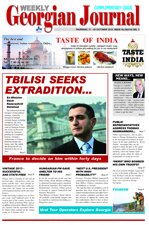Skull found in Georgia may change human evolution history
19 October, 2013
You must have Flash Player installed in order to see this player.
The spectacular fossilised skull of an ancient human ancestor that died nearly two million years ago has forced scientists to rethink the story of early human evolution.
Anthropologists unearthed the skull at a site in Dmanisi, a small town in southern Georgia, where other remains of human ancestors, simple stone tools and long-extinct animals have been dated to 1.8m years old.
Experts believe the skull is one of the most important fossil finds to date, but it has proved as controversial as it is stunning. Analysis of the skull and other remains at Dmanisi suggests that scientists have been too ready to name separate species of human ancestors in Africa. Many of those species may now have to be wiped from the textbooks.
The latest fossil is the only intact skull ever found of a human ancestor that lived in the early Pleistocene, when our predecessors first walked out of Africa. The skull adds to a haul of bones recovered from Dmanisi that belong to five individuals, most likely an elderly male, two other adult males, a young female and a juvenile of unknown sex.
The site was a busy watering hole that human ancestors shared with giant extinct cheetahs, sabre-toothed cats and other beasts. The remains of the individuals were found in collapsed dens where carnivores had apparently dragged the carcasses to eat. They are thought to have died within a few hundred years of one another, the Guardian informs.
"Nobody has ever seen such a well-preserved skull from this period," said Christoph Zollikofer, a professor at Zurich University's Anthropological Institute, who worked on the remains. "This is the first complete skull of an adult early Homo. They simply did not exist before," he said. Homo is the genus of great apes that emerged around 2.4m years ago and includes modern humans.
Other researchers said the fossil was an extraordinary discovery. "The significance is difficult to overstate. It is stunning in its completeness. This is going to be one of the real classics in paleoanthropology," said Tim White, an expert on human evolution at the University of California, Berkeley.
But while the skull itself is spectacular, it is the implications of the discovery that have caused scientists in the field to draw breath. Over decades excavating sites in Africa, researchers have named half a dozen different species of early human ancestor, but most, if not all, are now on shaky ground.
The remains at Dmanisi are thought to be early forms of Homo erectus, the first of our relatives to have body proportions like a modern human. The species arose in Africa around 1.8m years ago and may have been the first to harness fire and cook food. The Dmanisi fossils show that H erectus migrated as far as Asia soon after arising in Africa.
The latest skull discovered in Dmanisi belonged to an adult male and was the largest of the haul. It had a long face and big, chunky teeth. But at just under 550 cubic centimetres, it also had the smallest braincase of all the individuals found at the site. The dimensions were so strange that one scientist at the site joked that they should leave it in the ground.
The odd dimensions of the fossil prompted the team to look at normal skull variation, both in modern humans and chimps, to see how they compared. They found that while the Dmanisi skulls looked different to one another, the variations were no greater than those seen among modern people and among chimps.
The scientists went on to compare the Dmanisi remains with those of supposedly different species of human ancestor that lived in Africa at the time. They concluded that the variation among them was no greater than that seen at Dmanisi. Rather than being separate species, the human ancestors found in Africa from the same period may simply be normal variants of H erectus.
"Everything that lived at the time of the Dmanisi was probably just Homo erectus," said Prof Zollikofer. "We are not saying that palaeoanthropologists did things wrong in Africa, but they didn't have the reference we have. Part of the community will like it, but for another part it will be shocking news."
David Lordkipanidze at the Georgian National Museum, who leads the Dmanisi excavations, said: "If you found the Dmanisi skulls at isolated sites in Africa, some people would give them different species names. But one population can have all this variation. We are using five or six names, but they could all be from one lineage."
If the scientists are right, it would trim the base of the human evolutionary tree and spell the end for names such as H rudolfensis, H gautengensis, H ergaster and possibly H habilis.
The fossil is described in the latest issue of Science, the Guardian reports.
"Some palaeontologists see minor differences in fossils and give them labels, and that has resulted in the family tree accumulating a lot of branches," said White. "The Dmanisi fossils give us a new yardstick, and when you apply that yardstick to the African fossils, a lot of that extra wood in the tree is dead wood. It's arm-waving."
"I think they will be proved right that some of those early African fossils can reasonably join a variable Homo erectus species," said Chris Stringer, head of human origins at the Natural History Museum in London. "But Africa is a huge continent with a deep record of the earliest stages of human evolution, and there certainly seems to have been species-level diversity there prior to two million years ago. So I still doubt that all of the 'early Homo' fossils can reasonably be lumped into an evolving Homo erectus lineage. We need similarly complete African fossils from two to 2.5m years ago to test that idea properly."
The analysis by Lordkipanidze also casts doubt on claims that a creature called Australopithecus sediba that lived in what is now South Africa around 1.9m years ago was a direct ancestor of modern humans. The species was discovered by Lee Berger at the University of Witwatersrand. He argued that it was premature to dismiss his finding and criticised the authors for failing to compare their fossils with the remains of A sediba.
"This is a fantastic and important discovery, but I don't think the evidence they have lives up to this broad claim they are making. They say this falsifies that Australopithecus sediba is the ancestor of Homo. The very simple response is, no it doesn't."
"What all this screams out for is more and better specimens. We need skeletons, more complete material, so we can look at them from head to toe," he added. "Any time a scientist says 'we've got this figured out' they are probably wrong. It's not the end of the story."
• This article was amended on 18 October 2013. An earlier version incorrectly located Georgia in central Asia.





















































